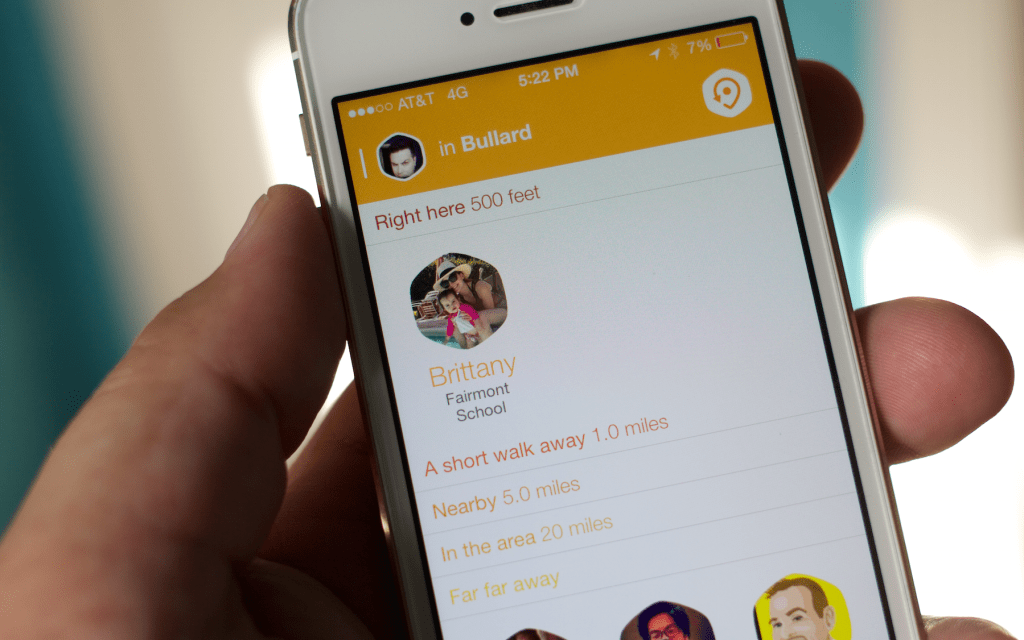Swarm is a new app from Foursquare out today that chisels off the check-in and proximity features of the main app and places them in a sparse, focus-driven new home. The app is nicely done, though it will be of most use to those in dense urban areas with lots of friends.
The underlying mechanics of Swarm are what’s really interesting here — and more importantly what it says about the next generation of apps you’ll be using on your smartphone.
There’s a fundamental shift in the way that we use apps underway, and the symptoms are all over the map. From a deeper, more thoughtful approach to push notifications to the breaking apart of large, unwieldy apps into smaller more focused components.
The shift we’re seeing will be the third strata of user interaction since the iPhone popularized the mobile app in a major way. The initial offerings for the iPhone and then Android devices adhered fairly closely to the ‘information appliance’ model. Using software, you transformed your phone into a mostly mono-purpose device just like it said on the tin. Now it’s a phone. Now it’s a calculator. Now it’s a messaging tool.

The second phase is the ‘home screen’ era, where every app fought hard to be your home base. The prevailing wisdom was that you had to cram everything your service offered into mobile, using a form of design-driven gavage to stuff your app until it was positively groaning with tabs and gutters and drawers.
Now, we’re entering the age of apps as service layers. These are apps you have on your phone but only open when you know they explicitly have something to say to you. They aren’t for ‘idle browsing’, they’re purpose built and informed by contextual signals like hardware sensors, location, history of use and predictive computation.
These ‘invisible apps’ are less about the way they look or how many features they cram in and more about maximizing their usefulness to you without monopolizing your attention.
What happens when a social network knows exactly what posts you’ll want to read and tells you when you can see them, and not before? What about a shopping app that ignores everything that you’re unlikely to buy and taps you on the shoulder for only the most killer of deals? What about a location aware app that knows where you and all of your friends are at all times but is smart enough to know when you want people to know and when you don’t?

A confluence of factors have made these kinds of context-aware apps possible at this point in time. Increasing power efficiency in physical memory and device processors has led to better battery life. That, in turn, has allowed Apple to loosen restrictions on access to satellite location services, and has made it actually practical not to micro-manage on some Android devices. As iOS and Windows Phone and Android get more sophisticated and more contextually aware, they’re providing the tools needed by developers to not only collate and act on these signals, but also to present them to a user with speed and care.
And services like Foursquare have reached a critical mass of data and users that have enabled it to develop systems for accurately telling whether you’re walking by a restaurant or actually walking in the doors.
I spoke to Foursquare CEO Dennis Crowley about Swarm a couple of weeks ago and he said they weren’t quite ready to passively ‘check people in’ to exact locations, but hinted that the technology was on its way. And, even with a powerhouse set of competitors like Google, Facebook and Apple — Foursquare seems to be thinking the hardest about this stuff and has a massive amount of historical data that puts other databases to shame.
The recent switch of Instagram’s location database to Facebook and away from Foursquare is an indicator of just how far ahead the company is when it comes to location. Try tagging a location to a photo these days and it’s a total crapshoot — a far cry from the spot-on results delivered when Foursquare data was being tapped.

Swarm is a brutally simple app, which doesn’t say anything negative about its execution, as it’s always harder to do simple correctly than it is to do complex.
This is very much the bones of the ‘check-in’ aspects of Foursquare, writ bold and bright across a small set of features that centers around a chart that shows you how close your friends are to you right now on a scale from ‘right here’ at 500 feet to ‘in the area’ of 20 miles. That’s essentially what this is about, serendipitous meet ups via passive or explicit location sharing coupled with a planning feature that lets you create gatherings using Foursquare’s friend network and database of places.
There’s a prominent ‘neighborhood sharing’ toggle that lets you swipe right at the top of almost any screen to go ‘incognito’. And you can finally do a concise search of your entire check-in history, which is great for trying to remember that place you went that time.

This is far from the first attempt at this kind of serendipity + location thing. Highlight, of course, was one of the more high profile goes, and Facebook has its own friends nearby feature. And there is a trail of attempts even before that into the dark days where location tech wasn’t even strong enough to support its own neck. So Swarm has its work cut out for it, for sure.
I think a lot of whether it’s successful or not will come in how well Foursquare is able to capitalize on the passive aspects of knowing where you are and where your friends are. If it’s able to get its confidence in location to the near-perfect point, it could even offer quiet, automatic checkins to specific places, not just neighborhoods. And once that happens you’ll get all of the benefits of checking in (logging, diary, a friendly digital wave to your friends) without having to actively remember to do it.
That will increase the value of Foursquare as a whole, as well as increasing the likelihood that you’ll keep Swarm installed.
 I personally find Foursquare absolutely essential when I’m away from home, and nearly useless when I’m there. But I live in a sparse suburban environment where ‘nearby’ is not very near at all — and I’m old(er) with a set group of friends. I’m curious to see whether the planning feature increases the utility of Swarm for me over time, otherwise it will probably be most effective in dense environments or where young people gather together to meet new people.
I personally find Foursquare absolutely essential when I’m away from home, and nearly useless when I’m there. But I live in a sparse suburban environment where ‘nearby’ is not very near at all — and I’m old(er) with a set group of friends. I’m curious to see whether the planning feature increases the utility of Swarm for me over time, otherwise it will probably be most effective in dense environments or where young people gather together to meet new people.
You’ve probably heard the argument that for an app to be truly successful it needs to earn a place on your home screen. That’s certainly true of a lot of mainstream messaging apps and will probably exist as a prominent metric until the home screen itself gets shaken up in a big way.
But, if Swarm does what it’s set out to, we could see another whole class of apps that not only don’t need to fight for a home screen slot, they don’t need to be opened at all to add value. And that’s interesting.
Swarm is available today for both iOS and Android.
Video by Josh Constine, read his disclosure here.






























Comment